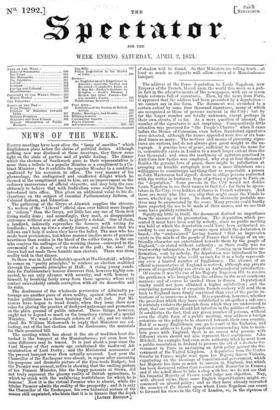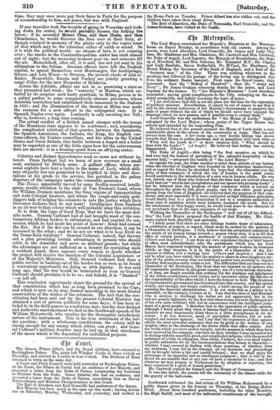The address' of the Peace deputation to Louis Napoleon, now
Emperor of the French, blazed upon the world this week as a pub- lic fact in the advertisements of the newspapers, with six or seven triple columns full of signatures. Then, by the news from Paris, it appeared that the address had been presented by a deputation— we cannot say in due form. The document was avouched to a certain extent by some four thousand signatures, many of which are recognized as those of persons eminent in the City ; but by far the larger number are totally unknown, except perhaps in their own streets, if so far. As a mere question of amount, the number of the signatures is not surprising. Comparatively little attention was procured for "the People's Charter' when it came before the House of Commons, even before fraudulent signatures were detected, although the names appended were five or six hun- dred times as many. The motives and means of procuring signa- tures are various, and do not always give great weight to the au- tograph. A genuine love of peace, sufficient to sign the name for it, undoubtedly exists in London to a much larger extent than the four thousand ; and since the machinery of agitators practised in Anti-Corn-law tactics was employed, why stop at four thousand ? Besides the genuine love of peace, there might be satisfaction at grouping an humble autograph near to a more illustrious one ; willingness to countersign anything that so respectable a person. as John Masterman had signed; desire to oblige persons connected with the writer in business ; hope of getting a journey to Paris on the "deputation." Some persons in the City would not dislike Louis Napoleon to see their names in that list ; for there be specu- lators in the City, even holders of shares in French railways. And there are many who like any step that might cause the Funds to move, whether up or down. In short, the obviously probable mo- tives may be enumerated by the score. Many persons could hardly have expected the use to be made of their names, and, we see that some have publicly retracted.
Signifying little in itself, the document derived no importance from the manner of its presentation. The deputation which pre- sented it must have been sent by nobody, since no public meeting was held at which the deputation could have been authorized ac- cording to our usages. The premiss upon which the declaration is based,—the " undersigned " having learned "that an impression exists in the minds of the people of France that feelings of an un- friendly character are entertained towards them by the people of England,"—is stated without authority ; as there really was no trustworthy information to that effect. Coming upon baseless in- formation, sent by nobody, the deputation was introduced to the Emperor by nobody who could avouch for it as a body represent- ing even a limited number of Englishmen. The absence of an official representative of England is noticed, although any private person of respectability can obtain an Ambassadorial introduction.
Of course it was the cue of his Majesty Napoleon III. to receive the gentlemen who brought him the address in the most courteous manner; and of course he invited them to dinner. Deputational vanity could not have obtained a higher satisfaction ; and the convincing persuasion of exquisite French cookery will send theni back to England more firmly convinced than ever of the pacific in- tentions of so courteous a host. It is a question, however, whether the precedent which they have established is altogether a safe one ; it certainly violates the principle from which they are understood to start, that one nation should not interfere in the politics of another. It establishes the fact, that any given number of persons, without even the slight form of a public meeting, may address a foreign potentate on the policy to be observed towards their own country. But if so many Englishmen can go to court at the Tuileries, and present an address to Louis Napoleon recommending him to main- tain peace with England, there is no reason why persons with different views should not also represent their sentiments. John Mitchell, for example, had even more authority when he went from a public association in Ireland to procure the aid of a de-facto Go- vernment in Paris in sustaining an Irish policy against the Go- vernment of the United Kingdom. A deputation from the Centro Gauche in France might wait upon her Majesty Queen Victoria, expatiatine,e on the blessings of constitutional government, which her Majesty has done so much to sustain in England, but which has been destroyed rather than restored with Monarchy in France; and if she asked them to take a chop with her, we do not see that his Imperial Majesty of France could lodge any objection. Nay, with altered views these same English deputationists might re- commend an altered policy; and as they have already recruited the number of the friends upon whom Louis Napoleon can count to forward his views in the City of London, so, in the ripeness of
time, they may once more pay their fares to Paris for the purpose of recommending to him, not peace, but war with England.



























 Previous page
Previous page